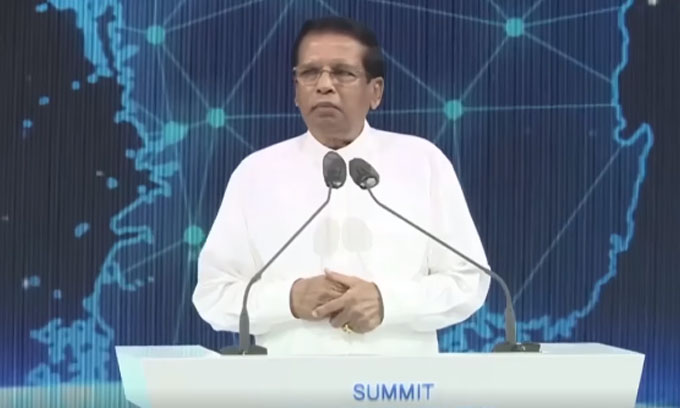(UTV | COLOMBO) – Former President Maithripala Sirisena says that despite 12 years passing since the end of the conflict, Sri Lanka has still not found a firm power-sharing mechanism or fulfilled total reconciliation as expected by international standards.
He said this while delivering the keynote address at the 2022 World Summit for Peace on the Korean Peninsula which was held in Seoul, South Korea. The former Sri Lankan President attended the summit at the invitation of former UN Secretary-General Ban Ki-moon.
Sirisena said that Mr. Ban Ki-Moon as the Secretary-General of the UN did his utmost to bring peace, reconciliation, democratic control of the situation after the conflict in Sri Lanka was over in May 2009.
“I believe in peace and avoidance of war, and conflict should not be the answer to any aberrations. What we require at such a point is confidence-building between parties and rebuilding the economies,” he said.
Therefore, Sri Lanka stepped into reconciliation, basing our actions on the internationally acclaimed “four pillars of reconciliation,” the SLPP parliamentarian said.
He said the international community anticipated and demanded extremely revolutionary and immediate remedial actions. “They are lofty expectations, but unfortunately, the expected speed does not reflect in the execution of reconciliatory mechanisms.”
He said Sri Lanka’s was a conflict of more than 25 years and Korea is about 70 years. Sirisena said reconciling competing interests and horrific pasts do not happen quickly, because scars are deep-rooted and thus adamancy rules. “Egos prosper.”
Hence, patience is required, which the former President said reminds him of the statement made by the Japanese business tycoon Konosuke Matsushita “Storms may pass, patience is a virtue.”
“Our conflict was over in May 2009. Still, twelve years later we have not found a firm power-sharing mechanism or fulfilled total reconciliation as expected by international standards.”
He said the experiences in the unification of Germany and Vietnam show how two contrasting political ideologies could positively merge. It could happen even in Korea similarly since the two political systems differ, he added.
Sirisena said though such conflicts may occur regarding Korea, one may reconsider the situation in the light of common language, culture, traditions, living patterns which are binding glues for sustainable integration.

